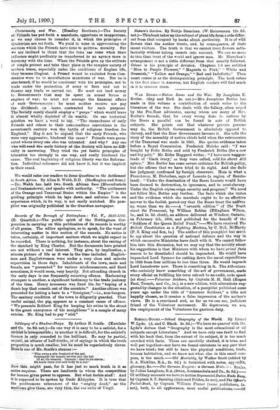Christianity and War. (Headley Brothers.)—The Society of Friends has put
forth a. manifesto, opportune or inopportune, as we may choose to consider it, in which the principles of Quakerism are set forth. We yield to none in appreciating the services which the Friends have done to pcliticai morality But we are inclined to think that the time tee come when their influence might profitably be transferred to en agency more in harmony with the time. When the Friends give up the attitude of simple protest and take their place in the complex society of modern times, especially .under the conditions of English life, they became-illogical. A Friend would be excluded from Corn. manion were he to manufacture munitions of war. But he is also:baund, if he would be consistent with his principles, not to trade under the protection of army or fleet, and not to finance any trade so carried out. He must not lend money to Governments that may be spent on armed forces or engines of war; he mast not manage the fina.ncial affairs of such Governments ; he must neither receive nor pay the dividends on loans contracted for such purposes The Society surely should employ a " purge " which would leave it almost wholly depleted of its wealth. On one historical question we have a word to -Sfik. "'The staunchness of early Friends and others to their conscientious convictions in the seventeenth century won the battle of religious freedom for England." May it not be argued that the early Friends, who were very aggressive, hindered the cause ? Friends were perse- cuted where every one else was tolerated • And why ? Any one who the early history .of--the- Society will have no diffi- culty in answering. They tried the yet feeble principles of toleration too strongly in one way, and really hindered the cause. The real beginning of religious liberty was the Reforma• tion. Individual reformers did not know it, but it was implicit in their creed.


































 Previous page
Previous page